Verbs That Start With S in English (With Meanings & Examples)
Expanding a child’s vocabulary aids their learning and development. In this article, we dive into the world of verbs that start with the letter ‘S,’ helping preschoolers and kids navigate the English language. Verbs are the action heroes of our sentences, bringing life and movement to our stories and conversations.
This content is focused on enriching the vocabulary for kids in an engaging, understandable, and fun way. Whether it’s for framing sentences, understanding stories, or just daily conversation, knowing a variety of English verbs starting with ‘S’ can be incredibly beneficial. So, let’s make learning an adventure and discover the actions and activities these verbs can describe, making this journey an essential part of vocabulary development for preschoolers and kids.
What Are The Verbs Beginning With S?
Verbs encompass many actions and states, making them integral to our daily vocabulary. These verbs, starting with the letter ‘S’, cover everything from simple movements and activities to complex emotions and interactions. Whether it’s ‘sing’ for expressing musical talent or ‘solve’ for working out a problem, each verb unlocks a new way to convey action and intent in our language.
Common Verbs Starting With S
When exploring English, we uncover a treasure trove of verbs with ‘S.’ This section highlights some of the most common verbs that start with the letter ‘S.’ These verbs form the basis of countless sentences, depicting actions, emotions, and states of being in our daily communication. Let’s dive into these verbs, understanding their meanings and witnessing them in action through example sentences.
1. Sing
To produce musical sounds with the voice, often melodiously and harmoniously.
Example: Sing your favourite song loudly and fill the room with joy.
2. Sit
Rest in a position where one’s weight is supported by one’s buttocks rather than one’s feet, with the back more or less vertical.
Example: Please sit down and make yourself comfortable.
3. Sleep
Being in a state of rest where one is not awake is typically done to recharge the body.
Example: Every night, we sleep to give our bodies the rest they need.
4. Smile
To form one’s features into a pleased, kind, or amused expression, typically with the corners of the mouth turned up and the front teeth exposed.
Example: Whenever you smile, the whole world seems brighter.
5. Speak
To speak means to say something to convey information, an opinion, or a feeling.
Example: It’s important to speak kindly to others.
6. Spell
To spell involves naming or writing the letters that form a word in the correct sequence.
Example: Can you spell your name for me?
7. Spend
Refers to using money to pay for goods or services.
Example: She loves to spend time reading books in the library.
8. Stand
To be in an upright position on one’s feet.
Example: Stand up straight to show confidence.
9. Start
Beginning something or going somewhere.
Example: Let’s start the game now!
10. Stay
To remain in a specific place or condition.
Example: Stay safe and don’t go out in the storm.
11. Study
The act of devoting time and attention to gaining knowledge on an academic subject, primarily through books.
Example: To ace the exam, you must study gently every day.
12. Suggest
Putting forward an idea or plan for consideration.
Example: I suggest we take a break and then continue our work.
13. Support
To bear all or part of the weight of something, be there for people, or to hold it up.
Example: Friends should always support each other in times of need.
14. Swim
Moving through water using one’s limbs, typically the legs and arms.
Example: Dolphins swim gracefully in the ocean.
15. Swing
Moving back and forth or from side to side while or as if suspended.
Example: Children love to swing high in the playground.
Action Verbs that Start With S
In this section, we explore action verbs starting with the letter S. Each verb is defined, followed by an example sentence to illustrate its use in context. This helps in understanding how each verb can be applied in various scenarios.
1. Savour
Enjoy or appreciate something fully, especially by taking the time to experience it thoroughly.
Example: Savour the moment because the little things make life worthwhile.
2. Scrutinise
To examine or inspect closely and thoroughly.
Example: Researchers scrutinise the data to ensure its accuracy before publishing their findings.
3. Seize
To take hold of suddenly and forcibly.
Example: The police officer seized the suspect before he could flee the scene.
4. Soar
To fly or rise high in the air.
Example: The eagle soared above the mountains, searching for its prey.
5. Solicit
To ask for or try to obtain something from someone.
Example: The charity solicited donations from local businesses to support their cause.
6. Speculate
To form a theory or conjecture about a subject without firm evidence.
Example: Investors speculated about the stock market’s future, leading to volatility.
7. Stabilise
To make or become unlikely to give way or overturn; become stable.
Example: Emergency services worked to stabilise the building after the earthquake.
8. Stimulate
To raise physiological or nervous activity levels in the body or any biological system.
Example: The lively discussion stimulated thought-provoking ideas among the students.
9. Strategise
To devise a strategy or plan of action, especially in business or military contexts.
Example: The team met to strategise their approach for the upcoming project deadline.
10. Stumble
To trip or momentarily lose one’s balance, almost fall.
Example: She stumbled over the loose rug but caught herself before falling.
11. Substantiate
To provide evidence to support or prove the truth of something.
Example: The researcher substantiated his theory with data collected from the experiment.
12. Synchronise
To synchronise means to cause to occur or operate at the same time or rate.
Example: The team worked hard to synchronise their movements for the dance performance.
Positive Verbs That Start With S
This section focuses on positive verbs that start with the letter ‘S.’ These verbs convey actions or states that have beneficial, uplifting, or productive connotations, contributing positively to sentences and contexts in which they are used.
1. Shine
To emit light or to be very talented or excellent in a particular area.
Example: She always shines in stressful situations, bringing calm and order.
2. Soothe
To gently calm or relieve pain or discomfort.
Example: The gentle music helped to soothe the baby to sleep.
3. Sparkle
To shine brightly with flashes of light, often suggesting liveliness or excitement.
Example: Her eyes sparkled with joy when she heard the good news.
4. Succeed
To achieve a goal or to accomplish a desired outcome.
Example: After years of hard work, he succeeded in his business venture.
5. Surpass
To exceed or go beyond expectations.
Example: The sequel surpassed the original movie in both storytelling and special effects.
6. Sustain
To strengthen or support physically or mentally.
Example: Regular exercise and a healthy diet sustain overall well-being.
7. Sympathise
To share or understand the feelings of another.
Example: She sympathised with her friend’s struggles, offering a listening ear.
8. Simplify
To simplify means to make something easier to do or understand.
Example: Breaking the project into smaller tasks will simplify the process for everyone.
9. Strengthen
To strengthen means to make or become stronger.
Example: The team strengthened their resolve to win the championship.
10. Share
To share means to have a portion of something with another or others.
Example: He decided to share his lunch with a colleague who forgot theirs.
11. Sprout
To sprout means to begin to grow; shoot forth as a plant from a seed.
Example: Tiny green plants began to sprout in the garden after the rain.
12. Spark
To ignite something or to stimulate interest or excitement.
Example: His innovative idea sparked enthusiasm among the team members.
More Verbs That Begin With S
In addition to the action and positive verbs we’ve already explored, many more verbs begin with the letter ‘S’ that enrich our language and allow for varied expression. These verbs cover a wide range of actions, emotions, and processes, showcasing the versatility of the English language.
| Verb | ||
| Sabotage | Scheme | Search |
| Saddle | Scold | Secure |
| Safeguard | Scoop | Seduce |
| Salute | Score | Seep |
| Sanction | Scour | Segregate |
| Saturate | Scout | Select |
| Saunter | Scowl | Sell |
| Save | Scrap | Send |
| Scald | Scrabble | Separate |
| Scale | Scramble | Serve |
| Scamper | Scrawl | Settle |
| Scan | Scream | Sew |
| Scar | Screen | Shade |
| Scare | Scribble | Shake |
| Scatter | Scroll | Shape |
| Schedule | Scrub | Shatter |
This table includes a diverse set of verbs beginning with ‘S,’ offering a glimpse into the vast array of verbs available in various contexts, from everyday conversations to academic writing. Each verb opens new possibilities for expressing actions, intentions, and emotions.
FAQs
1. What are verbs that start with the letter ‘S?’
Verbs that start with the letter S are action words that begin with the alphabetic character ‘S,’ such as ‘simplify,’ ‘succeed,’ and ‘sparkle,’ each carrying its distinctive meaning and application in sentences to describe actions, states, or occurrences.
2. How can using verbs that start with ‘S’ enhance writing?
Using verbs that start with S can enhance writing by adding variety, specificity, and vividness to descriptions, making narratives more engaging and expressive for readers.
Verbs allow us to articulate actions, emotions, and states in spoken and written language. From action verbs that convey dynamic processes to positive verbs that evoke uplifting sentiments, these words are essential tools for enhancing clarity, emotion, and depth in communication. We can craft more nuanced, engaging, and compelling narratives and messages by incorporating these diverse verbs that start with the letter ‘S’ into our vocabulary.
Also Read: Verbs That Start With A to Z
| A | B | C | D | E | F | G | H | I | J | K | L | M |
| N | O | P | Q | R | S | T | U | V | W | X | Y | Z |
Was This Article Helpful?
Parenting is a huge responsibility, for you as a caregiver, but also for us as a parenting content platform. We understand that and take our responsibility of creating credible content seriously. FirstCry Parenting articles are written and published only after extensive research using factually sound references to deliver quality content that is accurate, validated by experts, and completely reliable. To understand how we go about creating content that is credible, read our editorial policy here.





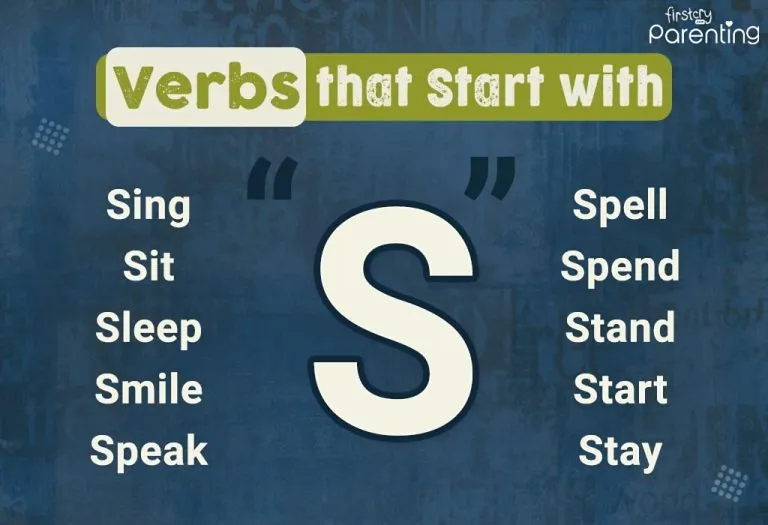
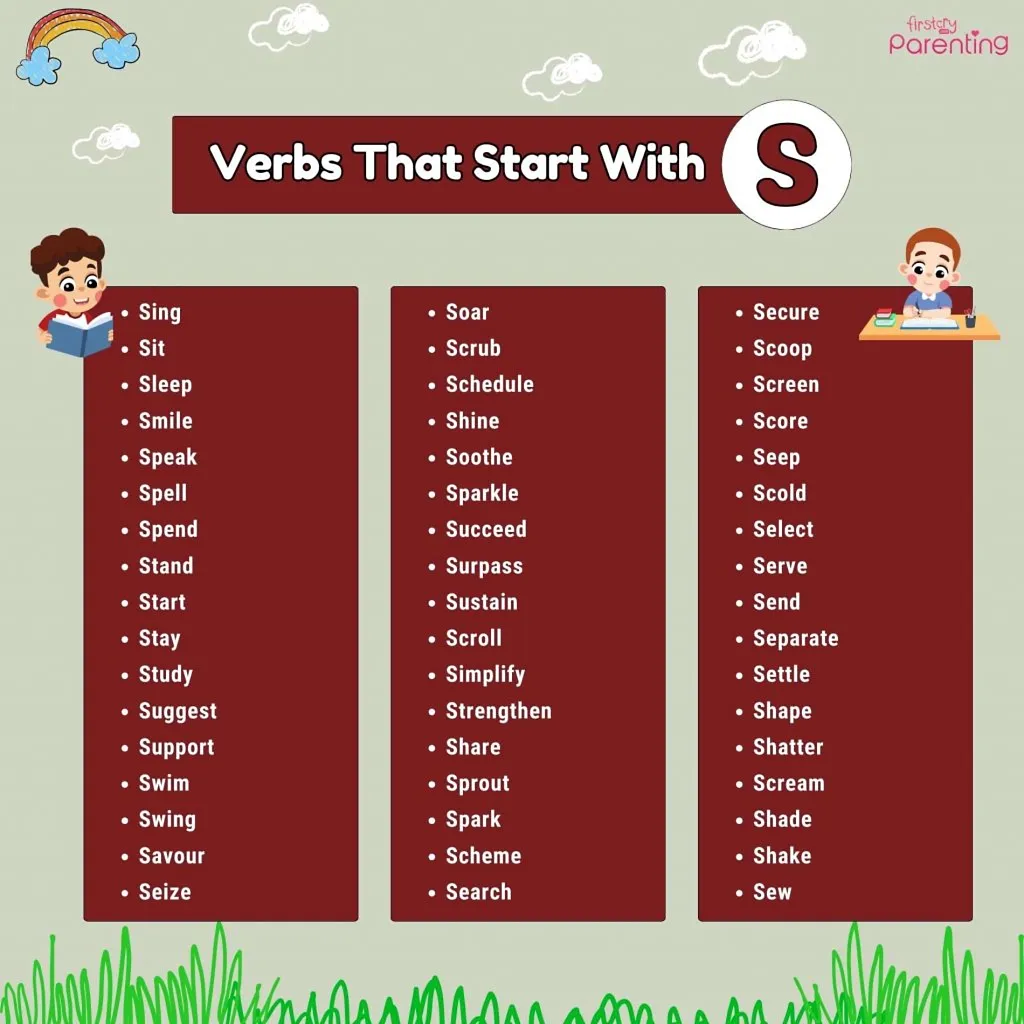
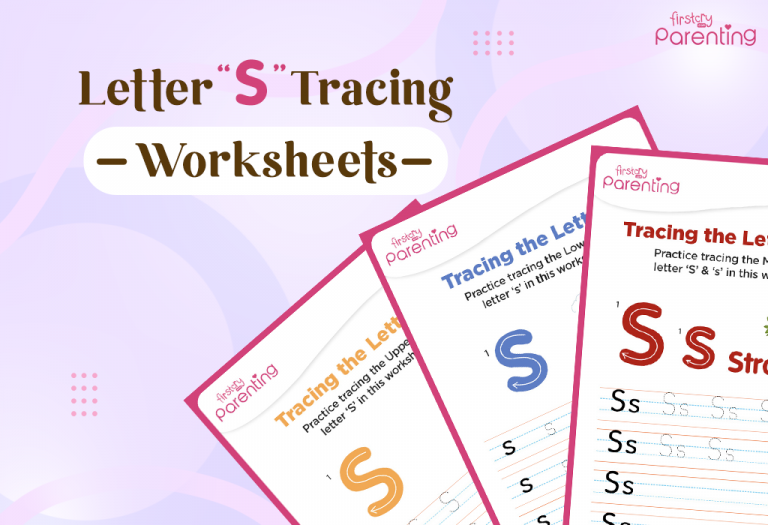


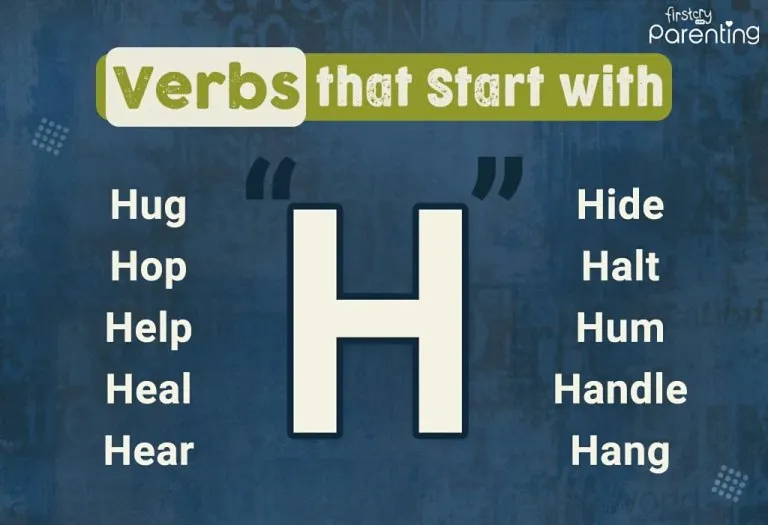
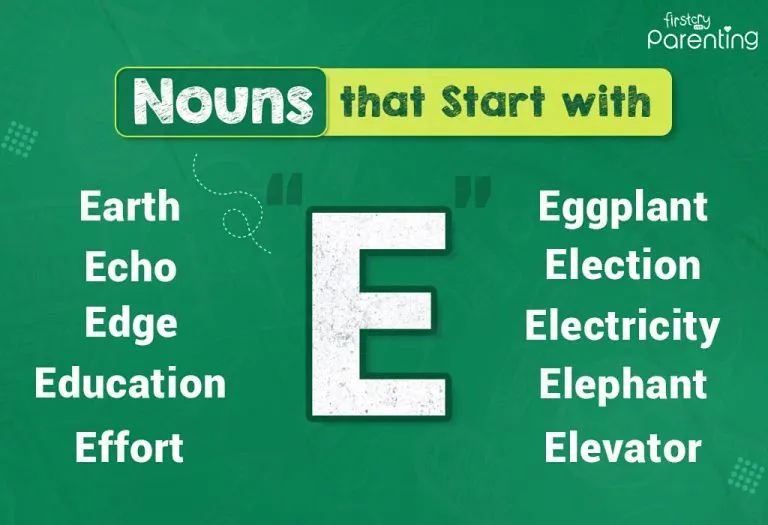


.svg)
















